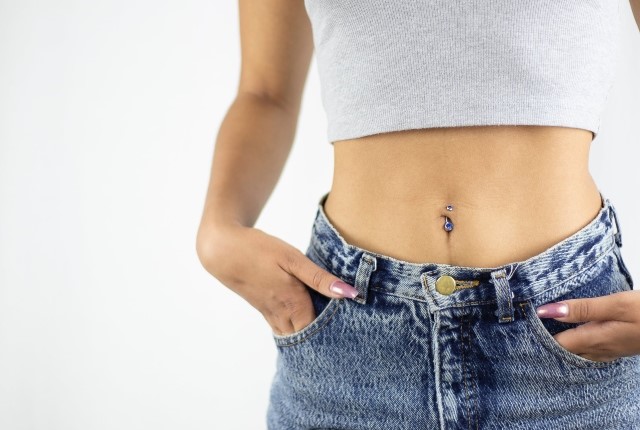
Body + Mind is reader-supported. We may earn an affiliate commission when you buy through some of the links on our site.
My friend and I jokingly refer to what we call the periodic poops. Whenever we get our periods, we end up going No. 2 a lot more than usual. Not only do some women experience an increase in the need to go when they menstruate, but they sometimes also experience pain. You may wonder, “why do bowel movements hurt during my period?”
If you have painful bowel movements during your period, you’re not alone. Several factors play a role in the underlying mechanisms. Let’s take a closer look at why the go feels less pleasant during certain times of the month.
Several reasons exist behind why women experience more painful bowel movements during their periods, but the condition is common. Many women suffer issues with the go during this time. One reason for the increase in pain is the way your body is structured.
Your uterus lies in the lower part of your abdomen, but it doesn’t occupy that cavity alone. It shares the space with your lower intestine and your colon, as well as your bladder, fallopian tubes and ovaries. When you get your period, the muscles of your uterus contract to expel the endometrial tissue, which lines the organ. When these contractions occur, they impact the surrounding organs.
Additional stimulation of the muscles of the bowels and intestines means you feel pressure to go more often. This can cause microscopic tears in the colon or even cause hemorrhoids if you strain too hard, causing additional pain.
Another answer to the question of “why do bowel movements hurt during my period” hinges on the activation of the nervous system. Regardless of the source of injury, without your nervous system, pain signals fail to travel to the brain where you process the signature “ouch.” During your period, the nerves surrounding your lower abdomen light up, letting you know, “Hey, we’ve got a bit of action down here. Cue the cramp signal.”
Your vagus nerve, the largest of your 12 cranial nerves, connects your gut area to your brain. This nerve may play a role in irritable bowel syndrome (IBS), as it influences the lower intestine and colon. Researchers discover more about the gut-brain connection daily, and while they don’t believe stress or anxiety causes IBS, it can exacerbate the condition.
Since your vagus is already activated by the contractions of your uterus, sending a few more pain impulses up the chain poses no problem. As a result, you may find bowel movements that normally rank as mildly uncomfortable excruciating.
This isn’t to say anxiety doesn’t play a role in increasing painful bowel movements during your period. Excess stress makes any physical pain feel worse, and many people suffer comorbid chronic pain when they have an anxiety disorder. If you experience anxiety and depression, speak with your therapist if you have one about ways to manage your disorders during your period.
Finally, your diet before and during your period can cause more painful bowel movements. If you reach for fatty foods and salty chips during this time, your body may struggle to break down the substances, leading to gastrointestinal woes. Instead, fuel your body with healthy probiotic-rich foods like yogurt and beneficial fats like those found in fish.
If you’ve treated your stress, modified your diet and still experience nuclear-level pain when you poop during your period, call your OB-GYN. Occasionally, endometrial tissue grows on organs outside of the uterus, causing problems. This condition, known as endometriosis, can impact your future fertility. However, many women with the disorder remain undiagnosed.
Treatment for endometriosis depends on the underlying cause of the condition. If hormonal imbalances cause the unusual tissue growth, treatment with replacements can bring relief. In other cases, doctors prescribe pain medications, oral contraceptives or both. In extreme cases, surgical interventions can correct the disorder. However, some such treatments — like hysterectomies — render women infertile.
Women who lack health care coverage, who represent a sad reality in America, may find relief and improve their future fertility chances by treating endometriosis naturally. One thing women who carry excess weight can do is shed some pounds through dietary changes and mild exercise. A recent study found obese women with the condition scored twice as high on the pain severity scale than women of normal weight.
Some women find relief through over-the-counter (OTC) pain medications, while others turn to herbs. Turmeric, for example, impacts levels of estradiol, a form of estrogen. Women with excess estrogen are more likely to develop endometriosis. The herb also acts as an anti-inflammatory, easing pain as effectively as OTC preparations.
Finally, resting a hot water bottle against your lower abdomen can ease some of the pain. This may increase the urge to go, but should decrease the associated discomfort.
Several factors may answer the question of “why do bowel movements hurt during my period?” However, you don’t have to suffer silently. Give your OB-GYN a call today to discuss your options.
Your email address will only be used to send you our newsletter, and at any time you may unsubscribe. For more information, see our Privacy Policy.